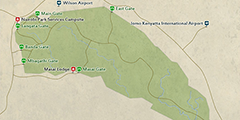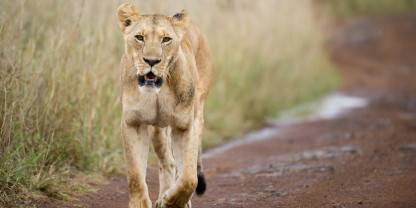There’s nowhere quite like Nairobi National Park, with incredible animals roaming free and wild against a not-so-distant backdrop of city skyscrapers. It’s among the best places in Kenya to see rhinos, and there’s a good chance that you’ll spot lions and an extensive portfolio of other safari species. Whether you visit the park as a lead-up to a longer safari, a final goodbye to Kenya, or the main event, Nairobi NP deserves as much time as you can give it.

-
Best Time To Go
- June to October (Little to no rainfall)
-
High Season
- December to January and July to October (Busy)
-
Size
- 117km² / 45mi²
-
Altitude
-
1,511-1,754m /4,957-5,755ft
 View Photos
View Photos
 View Photos
+21
Photos
View Photos
+21
Photos
 Open Map
Open Map
Pros & Cons
- Good wildlife viewing with many safari animals present
- Easy day or half-day trip from Nairobi
- Interesting photo possibilities with animals against city backdrop
- First-rate birding possibilities
- Animal orphanages around the park perimeter
- High density of
- One of the best places in Kenya to see
- The proximity to the city means it lacks wilderness appeal
- No elephants
- Only one inside the park
Wildlife
Nairobi NP has a decent variety of wildlife. Although elephants are absent, the rest of the are present. There is a good population of both and , with white rhino often seen grazing on the open plains. Leopards are shy, and cheetahs and are rarely spotted, but lions are commonly seen. It’s a good place to see many different antelope species in one park.
More about Nairobi National Park's wildlifeScenery
Nairobi NP is a sampler for Kenya’s safari landscapes, but with city buildings on the horizon (which can make for some unusual wildlife pictures). You enter the park along a track that descends through dry woodland before the panorama of grasslands opens up before you. Elsewhere in the park, there are , and rolling grasslands. In the park’s south, the Athi River Track shadows the river.
Activities
The main activity is the guided , where you’ll be driven around the park for wildlife viewing and bird watching. Self-guided game drives are also possible if you have your own vehicle. Note that you’re not allowed to step down from your vehicle anywhere inside the park, except for at a few picnic sites and the guided Hippo Pool Trail. , including dinner, are offered by Tribe Hotel.
Weather & Climate
In general, the Dry season (June to October) is marked by an absence of rain and loads of sunshine. Nairobi has two periods of rain (November to December and March to May), with an intervening period of drier weather. As with elsewhere in Kenya, the rains have become less reliable around Nairobi in recent years. The park’s high altitude means cool air is the norm at night.
More about the weather and climateBest Time To Visit
The Dry season months from June to October are generally the best time for seeing wildlife. During the wettest periods of the year (March to May, and to a lesser extent November and December), visitors will be treated to dust-free skies and an abundance of baby animals and . However, the wildlife will be harder to track down and driving conditions can be testing, to say the least.
More about the best time to visit



